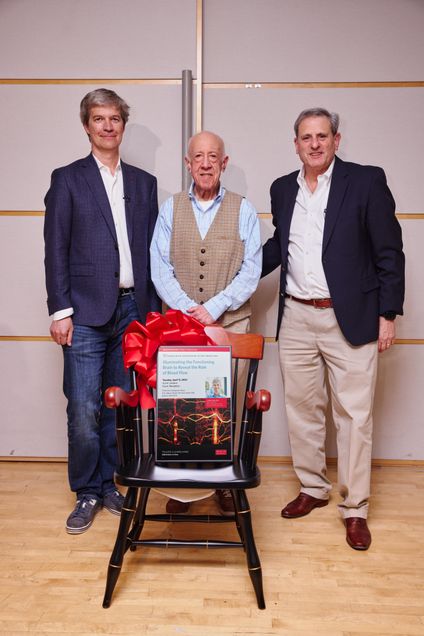Biomedical Optics Pioneer David Boas Delivers the 2023 DeLisi Lecture

After helping to set up extra chairs to accommodate a standing-room-only crowd in the BU Photonics Center’s Colloquium Room, Arthur G. B. Metcalf Endowed Chair and Distinguished Professor David Boas (BME, ECE) delivered the 2023 Charles DeLisi Award and Lecture on April 11. In “Illuminating the Functioning Brain to Reveal the Role of Blood Flow,” Boas shared his story of a career developing novel technologies for monitoring neuronal activity, and helping to translate those technologies into rehabilitation and other applications.
As an undergrad at Renssalaer Polytechnic Institute, Boas studied under the famous physicist Heinrich Medicus and was particularly fascinated with the Doppler effect, which describes changes in motion of a wave—including light waves. “So much of my professional and academic career has been based on the Doppler effect,” said Boas.
Next, Boas said, he pondered becoming a “ski bum,” but he realized that “I was as passionate about physics as I was about skiing.” He opted for grad school at the University of Pennsylvania. There, he worked with the noted biophysicist Britton Chance, who was in the early stages of developing functional near-infrared spectroscopy (fNIRS) as a means of detecting breast cancer. “It was a really great time to walk into his lab,” Boas said.
With Chance, Boas conducted experiments using photon propagation to study how light scatters and is absorbed by tissue. After earning his PhD, Boas was invited to start his own lab at Massachusetts General Hospital. Ultimately, Boas would be instrumental in refining fNIRS theories and applications, and in proving its utility in neuroscience. Essentially, Boas explained, blood flow acts as a stand-in for neuronal activity. Light can be scattered into the brain and back to noninvasively gain data on the amounts of hemoglobin present in the various regions of the brain.
At BU, where he directs the Neurophotonics Center, the first of its kind in the nation, Boas is pioneering wearable fNIRS technology. “We want to measure [brain activity during] perception, interaction, and walking, which are human behaviors that are rather challenging to measure with fMRI.” (Functional magnetic resonance imaging tests require subjects to lie stationary inside a metal tube in a clinic.)
With a $5.9 million grant from the National Institutes of Health, Boas and his interdisciplinary team are developing a portable, wearable brain imaging cap, studded with light-emitting sources and detectors. The gear includes a box for the electronics, which fits within a baby carrier. “So for the next few months, I’m going to carry my new baby around,” said Boas.
Boas is working with colleagues across the College of Engineering, the College of Arts & Sciences, and the College of Health & Rehabilitation Sciences (Sargent College) to apply the technology to a variety of studies. Eventually, readings from fNIRS wearables might be used in the detection and treatment of Alzheimer’s, Parkinson’s and other neurodegenerative diseases.
Before Boas’ presentation, Maysarah K. Sukkar Professor of Engineering Design and Innovation Elise Morgan (ME, MSE, BME), the associate dean for research and faculty development, presented Assistant Professor Hadi Nia (BME, MSE) with the Early Career Research Excellence Award. The award celebrates the significant, recent, high-impact research achievements of exemplary tenure-track faculty who are within 10 years of receiving their PhD.
One of the college’s signature events, the DeLisi Lecture recognizes researchers with extraordinary records of well-cited scholarship, senior leaders in industry, and inventors of transformative technologies. The lecture was endowed by Charles DeLisi, who served as dean of the college from 1990 to 2000. DeLisi recruited leading researchers in biomedical, manufacturing, aerospace and mechanical engineering, photonics and other engineering fields, establishing a research infrastructure that ultimately propelled the college into the top ranks of engineering graduate programs. In 1999 he founded—and then chaired for more than a decade—BU’s Bioinformatics Program, the first such program in the nation.